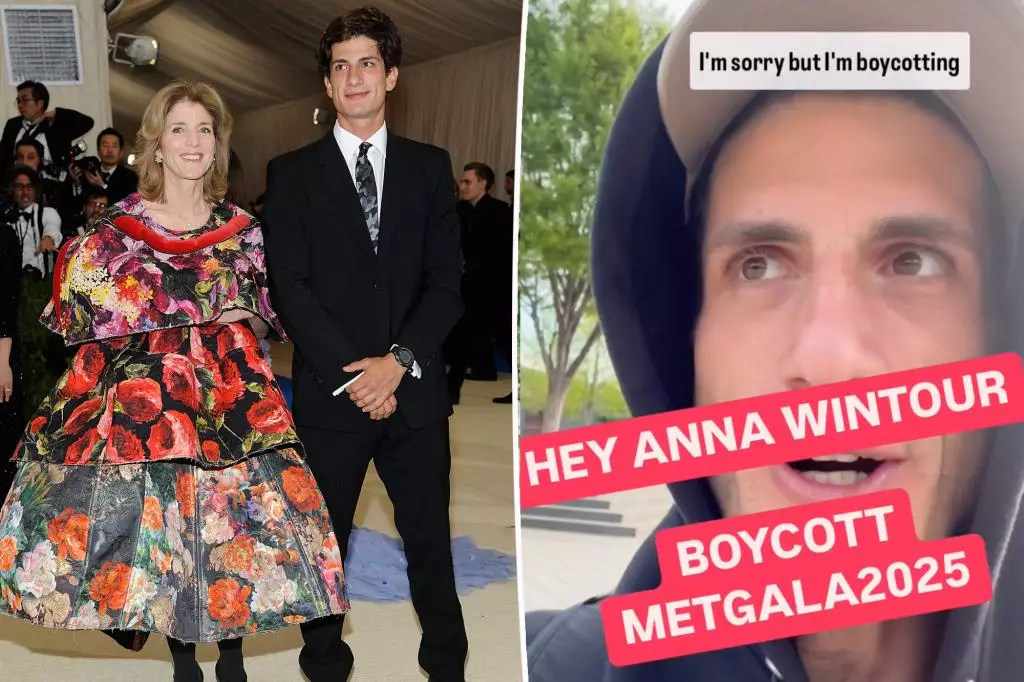In the realm of celebrity culture, few events shine brighter than the Met Gala, an extravagant annual gathering known as the “Oscars of fashion.” However, this year’s gala has stirred up more than just excitement over glitzy gowns and high-profile guests. Jack Schlossberg, the grandson of the late President John F. Kennedy and the son of Caroline Kennedy, has provoked a media storm with his self-proclaimed boycott. While some may cheer him on as a voice of reason amidst luxurious excess, a closer look at the situation reveals a rather different narrative.
Schlossberg publicly announced his intention to boycott the event, suggesting it would be inappropriate to celebrate amidst the turmoil both at home and abroad. While this statement resonates with a certain ethos, it’s impossible to ignore the irony that he wasn’t even on the guest list. Sources indicate he was last seen attending the Met Gala as a plus-one with his mother. The apparent boycott feels less like an act of protest and more like an elaborate performance, one that champions social consciousness while simultaneously garnering attention for himself.
Dissecting the Social Media Sensation
In a barrage of social media posts, Schlossberg shared his thoughts on the Met Gala and his reasons for opting out. In one Instagram update, he lamented the quietude of fashion institutions like Vogue on pressing societal matters, questioning why such powerful platforms should avoid using their influence for positive change. “Fashion is political – so then why is Vogue so quiet?!” he exclaimed in a post that straddled the line between genuine activism and self-promotion. For an individual who once held a freelance position at Vogue, these comments seem layered with irony—the very magazine he critiques for its alleged inaction was presumably once thrilled by his presence.
Yet, it is essential to examine whether Schlossberg holds any valid ground in his critique. Fashion houses indeed have affiliations with brands that dictate the guest list at the Met Gala, raising questions about exclusivity and accessibility. To claim a boycott under these circumstances feels disingenuous; he effectively lessens the impact of his statement by not addressing the broader systemic issues at play. Is his call for political awareness through fashion merely an attempt to reshape his narrative in a space he seems excluded from?
A Contradictory Performance
It’s crucial to consider how Schlossberg’s actions reflect broader trends within celebrity activism. The social media landscape allows for voices like his to emerge, but it often lacks depth and substance. His ten Instagram posts about his boycott have garnered attention, but one must wonder if he is sparking meaningful conversations or merely co-opting a stage for his personal brand. The juxtaposition of his supposed stand against the Met Gala and his desire to use the attention to further his own platform suggests a calculated move more than a principled stand.
Moreover, Schlossberg’s choice to pivot from a boycott to launching an informative project via his self-branded news channel raises eyebrows. Here lies the crux of the issue: instead of truly engaging with the critical themes of race, fashion, and activism, he risks commodifying the conversation for personal gain. His boycott could have been a rallying cry for genuine change within the fashion industry, yet it largely served as a springboard for his entrepreneurial ambitions.
The Pop Culture Paradox
In embracing the role of the outspoken boycotter, Schlossberg walks a fine line between influencer and activist. While social media can amplify voices advocating for social change, it also gives rise to a brand of activism easily reduced to hashtags and likes. The irony of a disinvited guest feigning moral superiority at an event he was not invited to serves as a poignant reminder of how celebrity culture often diverges from authenticity.
As Schlossberg navigates the realms of privilege, politics, and pop culture, one can’t help but ask: does his boycott hold any weight, or does it simply reflect a desperate grasp for relevance? The Met Gala, with its exorbitant cost and intricate politics, certainly isn’t for everyone — and perhaps it shouldn’t be. Yet in this circus of fame, the louder the voices of dissent grow, the more one must question their true intentions and impact.

